National Task Force (NTF) Against Covid-19 chief implementer and Vaccine Czar, Secretary Carlito Galvez Jr. has assured that while the Philippines is admittedly poor, its government is exerting all efforts to secure the vital coronavirus jabs for all Filipinos.
Galvez said that despite the challenges in acquiring its vaccine share from the limited global supply, the country expects to receive its next batches of vaccine shipments in the second quarter of the year to augment the initial batch was delivered in March. The delivery was aside from the one million vials donated by China.
He explained that the government expects to secure the bulk of Covid-19 vaccines by the third quarter of this year, once ongoing negotiations with pharmaceutical companies push through.
“Based on our current negotiations, we will be able to purchase at least 148 million doses from more or less seven manufacturers. However, it will be dependent on the global supply,” Galvez said.
Around 800,000 out of 1.4 million doses of CoronaVac vaccines, he said, will be deployed in areas under enhanced community quarantine, such as Metro Manila and the nearby provinces of Bulacan, Rizal, Laguna and Cavite, he said, adding that the shipment of 2.6 million doses of AstraZeneca vaccine initially procured by the private companies are expected to arrive in May
Galvez said the government is also finalizing supply agreements with pharmaceutical firms Johnson&Johnson of the United States and Gamaleya Research Institute of Russia by the second week of April.
The government, he said has already sealed supply deals with Sinovac, Moderna, AstraZeneca, and Novavax.
He shared that about 80% of the available global vaccine have already been procured by rich countries, which explains why the Philippines is experiencing slight delays in vaccine deliveries due to “global logistics constraints.”
A March 31 New York Times (NYT) report said “86% of shots that have gone into arms worldwide have been administered in high- and upper-middle-income countries, and only 0.1% of the doses have been administered in low-income countries.”
Based on data compiled by the United Nations International Children’s Emergency Fund (Unicef), the same NYT report said, “low-income countries made their first significant vaccine purchase agreements in January 2021 – eight months after the United States and the United Kingdom made their first deals.”
